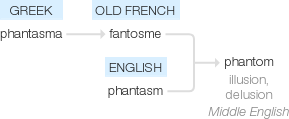Phantom
Middle English (also in the sense ‘illusion, delusion’): from Old French fantosme, based on Greek phantasma (see phantasm).
wiktionary
From Middle English fantom, fantum, from Old French fantosme, fantasme, from Latin phantasma(“an apparition, specter; (in Late Latin also) appearance, image”), from Ancient Greek φάντασμα(phántasma, “phantasm, an appearance, image, apparition, specter”), from φαντάζω(phantázō, “I make visible”). Doublet of phantasm.
etymonline
phantom (n.)
c. 1300, fantum, famtome, "illusion, unreality; an illusion," senses now obsolete, from Old French fantosme (12c.), from Vulgar Latin *fantauma, from Latin phantasma "an apparition," from Greek phantasma "image, phantom, apparition; mere image, unreality," from phantazein "to make visible, display," from stem of phainein "to bring to light, make appear," from PIE root *bha- (1) "to shine." The ph- was restored in English late 16c. (see ph).
Meaning "a specter, spirit, ghost" is attested from late 14c.; that of "something having the form, but not the substance, of a real thing" is from 1707. As an adjective from early 15c. (Coleridge used phantomatic for "phantom-like, unreal"). Phantom limb "sensation of the presence of an amputated arm or leg" is attested by 1871.
